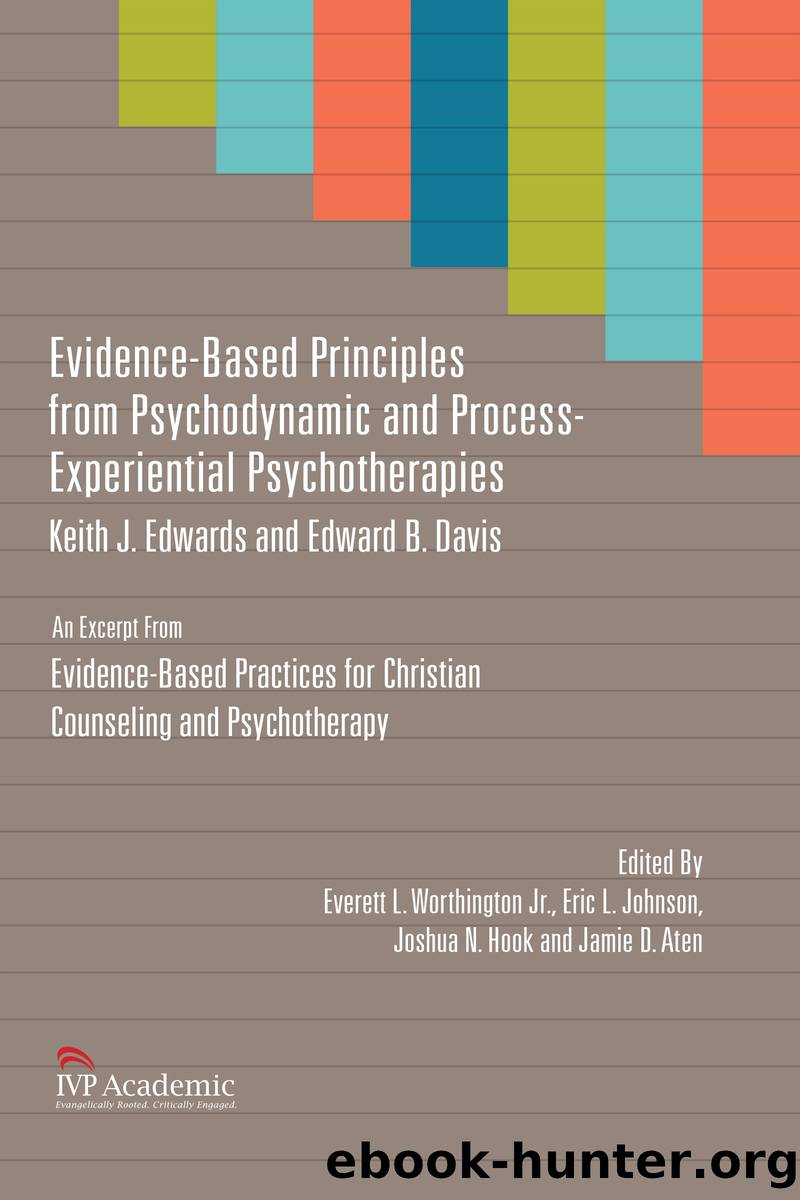Evidence-Based Principles from Psychodynamic and Process-Experiential Psychotherapies by Edwards Keith J.;Davis Edward B.; & Edward B. Davis

Author:Edwards, Keith J.;Davis, Edward B.; & Edward B. Davis [Edwards, Keith J.]
Language: eng
Format: epub
ISBN: 9780830882106
Publisher: InterVarsity Press
Published: 2016-02-09T00:00:00+00:00
Summary and Conclusion
In this chapter, we have summarized the psychodynamic and PE outcome research, which has revealed that each of these psychotherapies is more efficacious than inactive comparison groups (e.g., control groups) and is as efficacious as other active treatments (e.g., evidence-based treatments). We also have described a three-phase model of experiential therapy (Greenberg & Watson, 2006) and have discussed interventions that can be employed in each phase, including examples of how to use experiential interventions in Christian counseling and psychotherapy.
As we conclude this chapter, we want to make it clear that we are not suggesting that experiential interventions are more effective than other interventions or are uniformly effective with all clients. In fact, we recommend that psychotherapists routinely practice informed theoretical/technical pluralism and patient-treatment matching. That is, we recommend that psychotherapists cultivate a habit of thoughtfully drawing on a broad range of theories and techniques, with an attitude of flexibility, openness and humility (informed theoretical/technical pluralism; Moriarty & Davis, 2012) and of making strategic, research-informed clinical decisions that integrate client, relationship and technique factors (patient-treatment matching; Harwood et al., 2011). With regard to the latter, the evidence-based principles of systematic treatment selection prescribe that insight-oriented, relationship-Âfocused interventions (e.g., the interventions we describe in this chapter) are most likely to be effective with individuals who have an internalizing coping style (i.e., tend to internalize blame, be introverted and cope by turning inwardly). In contrast, skill-building and symptom-removal interventions (e.g., CBT) are more likely to be effective with individuals who have an externalizing coping style (i.e., tend to externalize blame, to be extroverted and to cope by acting outwardly; Norcross, 2011).
In conclusion, the take-home evidence-based practice recommendation of this chapter is that, within Christian counseling and psychotherapy, psychodynamic and PE interventions are most likely to be effective with Christian clients who have an internalizing coping style. With such clients, use the interventions we have described, accommodating them by incorporating religion/spirituality into therapy goals and tasks and by emphasizing experiential processing not only of clientsâ human relationships but also their emotional relationship with God. In time, we hope that Christian-Âaccommodated psychodynamic and PE techniques will be thoughtfully developed and empirically examined, so that such interventions can be selected and utilized with confidence, in the context of evidence-based Christian counseling and psychotherapy.
Download
This site does not store any files on its server. We only index and link to content provided by other sites. Please contact the content providers to delete copyright contents if any and email us, we'll remove relevant links or contents immediately.
| Children's Ministry | Counseling & Recovery |
| Discipleship | Evangelism |
| Missions & Missionary Work | Preaching |
| Sermons | Youth Ministry |
Fangirl by Rainbow Rowell(8487)
How to Bang a Billionaire by Alexis Hall(7762)
Wonder by R. J. Palacio(7485)
The Space Between by Michelle L. Teichman(6420)
The Thirst by Nesbo Jo(6244)
Assassin’s Fate by Robin Hobb(5635)
Wiseguy by Nicholas Pileggi(5046)
The Night Circus by Erin Morgenstern(4815)
The Kite Runner by Khaled Hosseini(4807)
Bittersweet (True North #1) by Sarina Bowen(4582)
Paper Towns by Green John(4574)
Gerald's Game by Stephen King(4222)
Too Much and Not the Mood by Durga Chew-Bose(3950)
Pillow Thoughts by Courtney Peppernell(3819)
Goodbye Paradise(3272)
Twelve Days of Christmas by Debbie Macomber(3270)
Good by S. Walden(3179)
The Rosie Effect by Graeme Simsion(3027)
The Cellar by Natasha Preston(2927)
